Thousands of years ago, God promised the people of Israel a new covenant. Today, as we begin another new year, our thoughts tend towards new things. Yet, just as with Israel long ago, if we try to match old with new, the hope and promise of the new covenant will fail and the same old, same old will continue.
“But this is the new covenant I will make with the people of Israel on that day,” says the Lord, “I will put my laws in their minds, and I will write them on their hearts. I will be their God, and they will be my people.”
Jeremiah 31:33 (NLT)
The new year brings to mind the prospect of new beginnings. A new start. The hope of shedding those things that have brought us down in the past that we may rise to new heights in the future. Jesus was, among many other things, the bearer of new beginnings for many during His time on earth. We hear many stories of Jesus turning lives around in incredible ways. Why was He able to do this? Can He do this for each of us still today?
Let’s answer these two questions.
Jesus fulfilled God’s promise for a new covenant.
Through the prophet Jeremiah, God promised a new covenant. When Jesus came to earth, lived a sinless life, died and was raised from the dead, He fulfilled God’s promise. But many did not recognize that Jesus was the standard bearer for the new covenant. Why did they miss it when it was right in front of them? For the same reason many today miss it. You see, the new covenant required then, and still requires today, that something else also be new in order for it to work. Without this something else, anything that might masquerade as new is really just the old in disguise, frustratingly ineffective for any who stick to it. Jesus found many bound and determined to stick to the old components and taught them to recognize that the new covenant needed to be truly new in order for it all to work. What He taught them was…
The old covenant is static; the new one isn’t
One day Jesus was asked why His disciples didn’t fast as many other righteous men of the time did. Jesus immediately saw people stuck in the old covenant and used an example to illustrate His point. Just using old rituals (fasting) to enable the new covenant was like putting new wine into an old wineskin. In those days, new wine was placed into goatskin flasks to ferment, which stretched the skins out. Once stretched to their limit, the skins could not be used for new wine again because they would burst, spilling the wine and ruining the skin. The new covenant, like new wine, must have room to grow. The new covenant was not just about rituals, but about a dynamic, growing relationship with God. This required something that was new and pliable that could grow along with it.
Old hearts are hard; we need new hearts that aren’t
Our hearts, in old covenant mode, are described by God as hardened, stony, with sin chiseled into them. (see Jeremiah 17:1) This doesn’t sound like something that can stretch and grow as a relationship with God grows, does it? Trying to approach a relationship with God with a hard heart doesn’t work. It would, if God would allow it, ruin both the covenant and the heart. Imagine the new covenant spilling uselessly on the ground among the shattered pieces of an unyielding heart. God knows the new covenant is far too precious to be placed into such a predicament. The old covenant rituals, such as fasting, are temporary, imperfect ‘band aids’ that need constant reapplication. They help us know about God, but they don’t fundamentally change hard hearts, they just serve as reminders of our sinful nature and our need for redemption. The new covenant is not an old reminder, it’s a new heart. A ‘new covenant’ heart allows God to live within us, in a personal relationship, so we can exchange the old, distant, knowing about God with intimately knowing God. In response, God puts His will in our minds and writes it permanently on our hearts. From this point forward, our relationship with God can grow and expand to meet all that God has purposed and planned for us.
A rich young man (see Matthew 19:16-22)
A young man came to Jesus and asked “what good things must I do to have eternal life?”
Jesus recognized the ‘old covenant’ at work immediately. Eternal life is not something earned by good deeds, but established in a personal relationship with God. Jesus steered the conversation to reveal this to the young man. In response, the young man sadly walked away. This new covenant did not fit into a stony heart that the young man was unwilling to open up to Jesus.
Another rich young man (see Luke 19:1-10)
A man named Zacchaeus sought out Jesus also. Now Zacchaeus had an occupation that required a hard, stony heart—he overcharged his fellow Jews for the taxes they owed to the Roman government and got rich pocketing the difference. After Jesus spent an evening with him, Zacchaeus agreed to give half of his possessions to the poor and to pay back four times what he had cheated out of others. Zacchaeus got it! He entered into the relationship that the first young man turned down. He received the new covenant with a new heart!
Jesus’ new covenant offer still stands today. The requirement remains the same, something else must be also be new— it’s the heart . If we will toss aside our old, hard hearts and accept a supple, tender, new heart, the new covenant can live and grow in us. That’s the truth.
“But this is the new covenant I make with you. I will put my laws in your mind, and I will write them on your heart. You must receive My covenant with your new heart so the you can come to truly know Me as your God. Then you will be all Mine and I will be all yours!
That’s the YouTruth – I Will Write My Law on Your Heart.
Happy New Year!
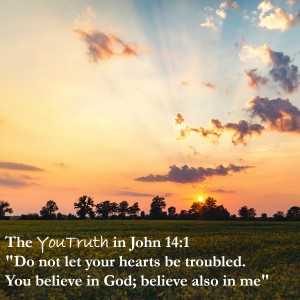

 The YouTruth in Romans 15:13
The YouTruth in Romans 15:13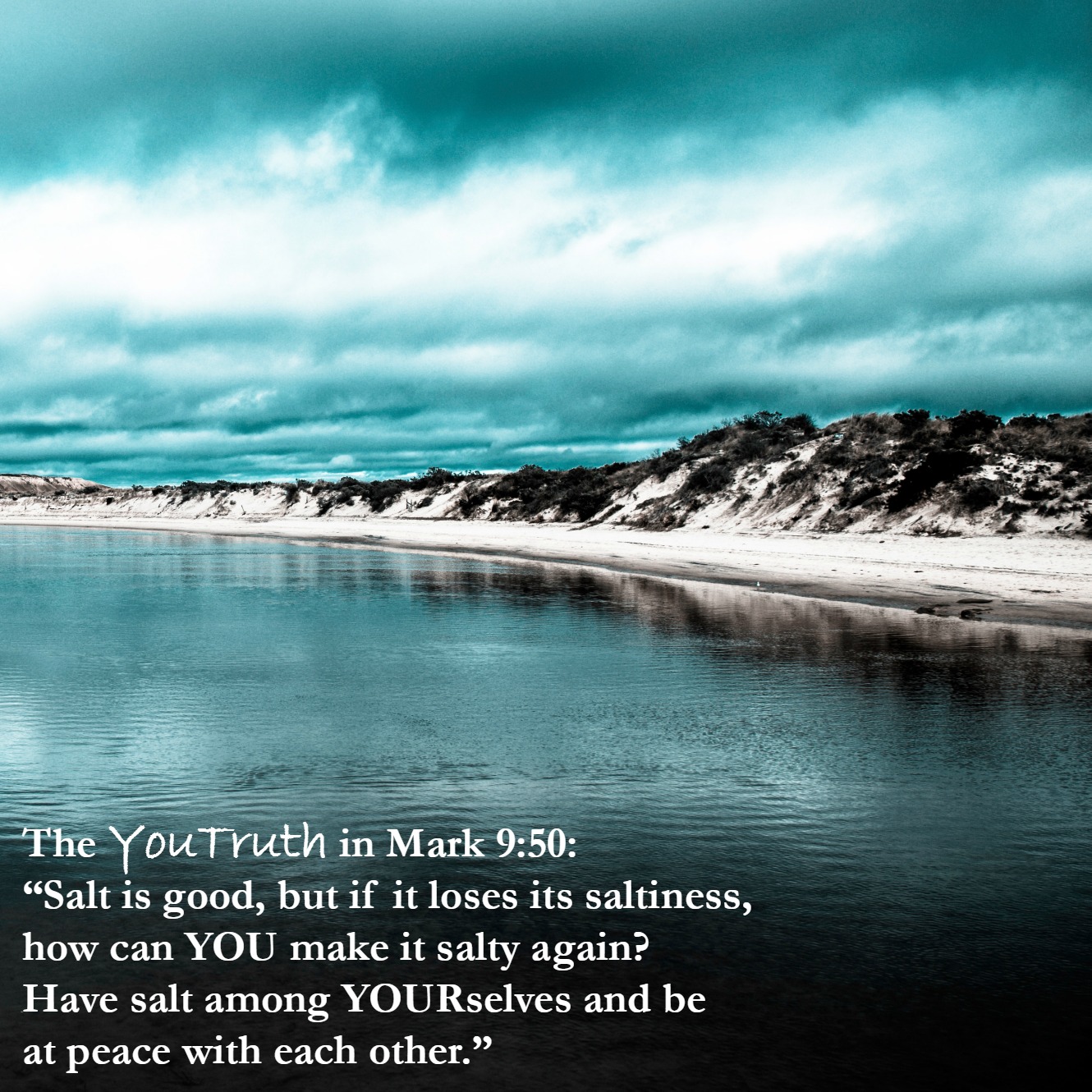 The YouTruth in Mark 9:50
The YouTruth in Mark 9:50 The YouTruth in Colossians 3:1
The YouTruth in Colossians 3:1 The YouTruth in John 14:27
The YouTruth in John 14:27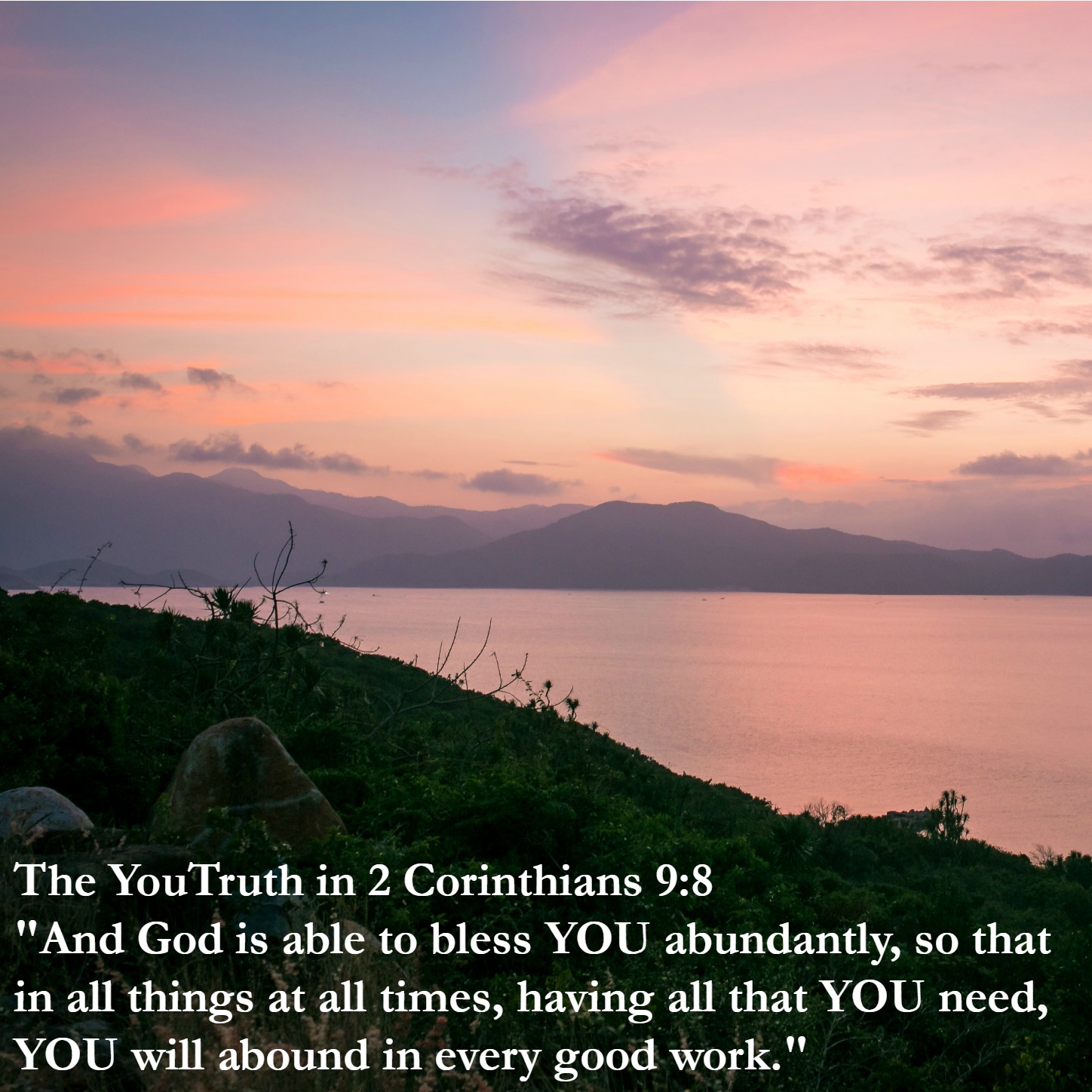 The YouTruth in 2 Corinthians 9:8
The YouTruth in 2 Corinthians 9:8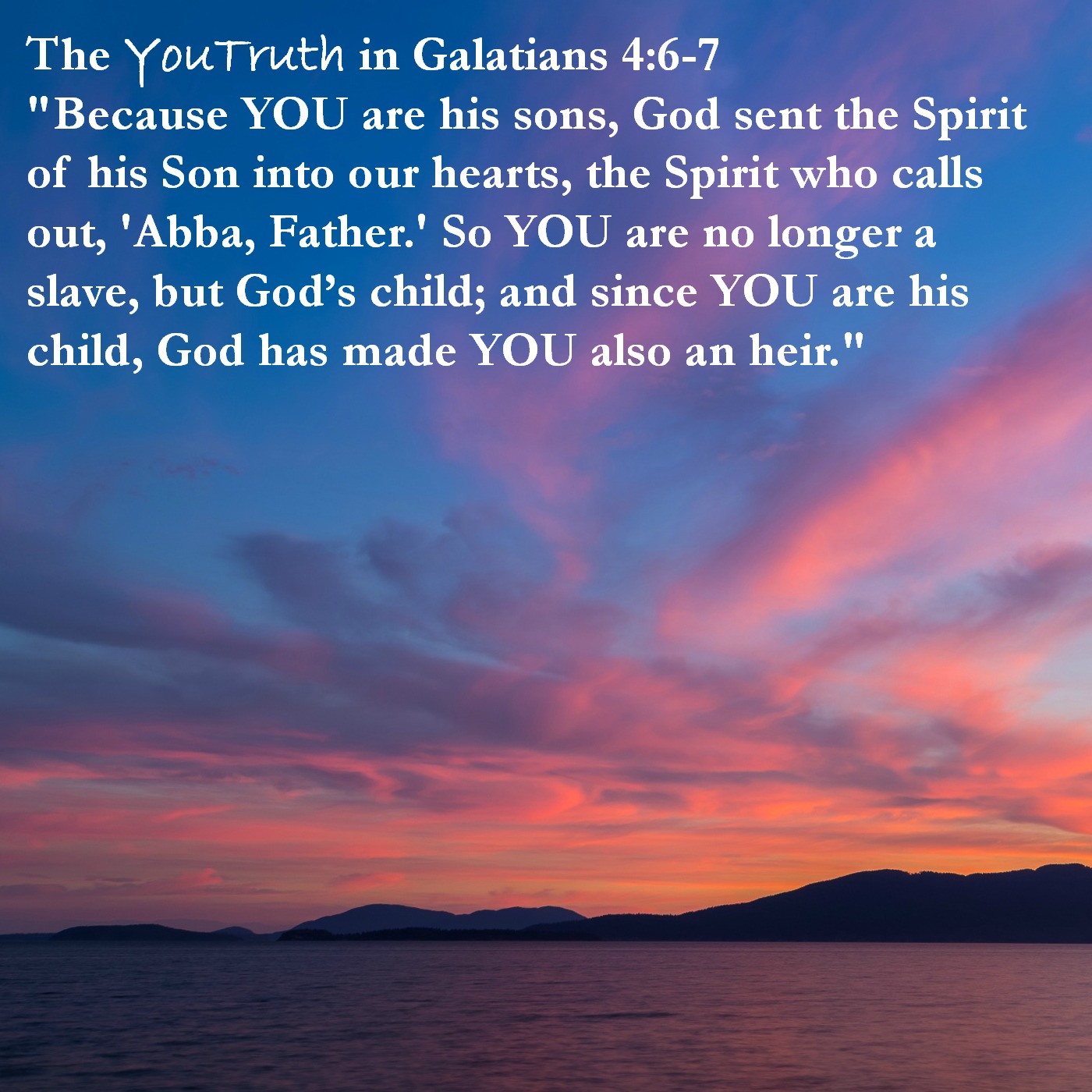 The YouTruth in Galatians 4:6-7
The YouTruth in Galatians 4:6-7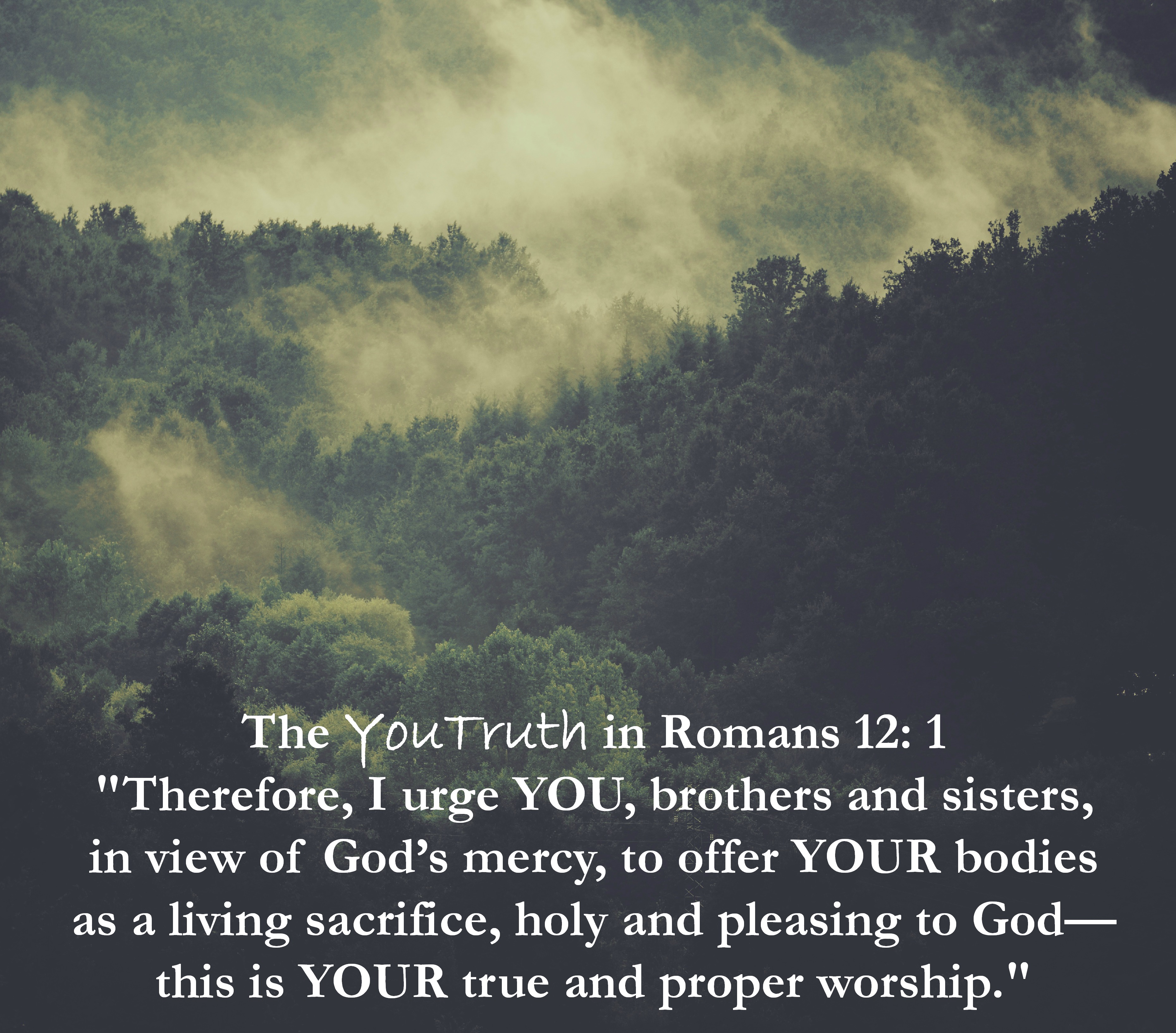 The YouTruth in Romans 12:1
The YouTruth in Romans 12:1 The YouTruth in Deuteronomy 6:5
The YouTruth in Deuteronomy 6:5